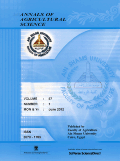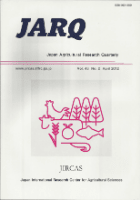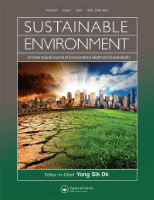
Granja-Revista de Ciencias de la Vida
Scope & Guideline
Transforming Research into Action for Latin America
Introduction
Aims and Scopes
- Sustainable Agriculture Practices:
The journal emphasizes research on sustainable agricultural practices, including studies on crop management, pest control, and the impact of climate change on agricultural productivity. - Environmental Management and Conservation:
Research on environmental regulations, conservation strategies, and the ecological impacts of human activities, particularly in relation to biodiversity and ecosystem services. - Socio-Economic Impacts of Agriculture:
Focus on the socio-economic aspects of agriculture, including the influence of agribusiness, community engagement, and the economic sustainability of agricultural practices. - Health and Food Safety:
Investigations into food safety, animal health, and the effects of agricultural practices on human health, including studies on contaminants and disease management. - Ethnoecology and Community Knowledge:
Exploration of traditional ecological knowledge and practices, integrating indigenous perspectives into sustainable development and environmental management.
Trending and Emerging
- Climate Change Adaptation Strategies:
There is a growing emphasis on research that addresses climate change adaptation in agriculture, focusing on innovative practices and technologies that enhance resilience in farming systems. - Integrated Water Resource Management:
Emerging studies highlight the importance of integrated water management practices, particularly in relation to community engagement and adaptation to changing environmental conditions. - Biodiversity and Ecosystem Services:
A notable increase in research surrounding biodiversity conservation and ecosystem services, reflecting a trend towards understanding the ecological impacts of agricultural practices. - Health Impacts of Agricultural Practices:
Research focusing on the health implications of agricultural practices, including food safety and the effects of pesticides on both human and environmental health, is becoming more prominent. - Ethnoeducation and Community Engagement:
The integration of ethnoeducation and community perspectives in research is on the rise, emphasizing the role of local knowledge in promoting sustainable development and environmental stewardship.
Declining or Waning
- Traditional Agricultural Techniques:
There has been a noticeable decrease in studies focusing on traditional agricultural techniques, possibly due to a shift towards more innovative and sustainable practices that incorporate modern technology. - Animal Husbandry Practices:
Research on conventional animal husbandry practices appears to be less frequent, indicating a potential decline in interest as more attention is shifted towards sustainable and ethical farming practices. - Chemical Pesticides and Fertilizers:
The decreasing prevalence of studies related to chemical pesticides and fertilizers suggests a waning interest in these areas, possibly due to increasing awareness and research on organic and environmentally-friendly alternatives.
Similar Journals

CABI Agriculture & Bioscience
Empowering global collaboration in agricultural sciences.CABI Agriculture & Bioscience is an esteemed international journal published by SpringerNature, dedicated to advancing the fields of Agricultural and Biological Sciences, Animal Science, and Horticulture. With a strong focus on promoting Open Access research since 2020, this journal aims to disseminate scientific knowledge and innovative findings that contribute to sustainable agricultural practices and bioscience advancements. Situated in the United Kingdom, it has rapidly established itself as a premier platform, achieving impressive Q1 rankings in multiple categories, including Agricultural and Biological Sciences and Horticulture, as well as being among the top tier in Food Science. Its exceptional standing—reflected in its Scopus rankings, where it ranks in the 88th and 86th percentiles in key fields—underscores its importance to researchers, professionals, and students alike, fostering an environment for impactful collaboration and growth in the biosciences. By offering Open Access options, CABI Agriculture & Bioscience ensures that vital research is available to a broad audience, facilitating increased visibility and engagement within the global scientific community.

JOURNAL OF THE FACULTY OF AGRICULTURE KYUSHU UNIVERSITY
Advancing Agricultural FrontiersJOURNAL OF THE FACULTY OF AGRICULTURE KYUSHU UNIVERSITY is a reputable academic journal dedicated to advancing knowledge in the fields of agriculture and biological sciences. Published by Kyushu University, Faculty Agricultural Publications, this journal serves as a platform for researchers and professionals to share original research, innovative methodologies, and critical reviews that focus on biochemistry, genetics, molecular biology, as well as agronomy and crop science. Although the journal's coverage in Scopus has been discontinued as of 2020, it continues to hold significance within the academic community, evidenced by its rankings in the 20th percentile for significant categories. The journal welcomes contributions that push the boundaries of current agricultural practices and enhance sustainable development in the field. Researchers and students seeking to enrich their understanding of agricultural sciences will find invaluable insights and diverse perspectives within its pages. The journal’s commitment to fostering scientific dialogue remains clear, as it continues to be an integral resource for the agricultural academia landscape in Japan and beyond.

Revista Brasileira de Ciencias Agrarias-Agraria
Fostering innovation in agriculture through open access.Revista Brasileira de Ciencias Agrarias-Agraria is an esteemed academic journal published by the Universidade Federal Rural de Pernambuco, dedicated to advancing the field of agricultural and biological sciences. With a focus on disseminating high-quality research, this journal plays a pivotal role in fostering knowledge exchange within the agricultural community, particularly in Brazil and beyond. As a Q3 ranked publication in the Agricultural and Biological Sciences category, Revista Brasileira de Ciencias Agrarias-Agraria contributes to the growing body of literature by featuring insightful articles from both emerging and established researchers in the field. The journal has been consistently published since 2011 and is committed to open access principles, ensuring that research findings are accessible to a wide audience. Researchers, professionals, and students will find this journal an invaluable resource for deepening their understanding of current trends and innovations in agriculture.

Bioagro
Exploring innovative research for a greener future.Bioagro is an esteemed academic journal dedicated to advancing research in the field of Agricultural and Biological Sciences. Published by the University Centroccidental Lisandro Alvarado in Venezuela, this journal has made significant strides since its inception in 2008, with a focus on delivering high-quality research publications that address contemporary challenges in agriculture and biology. Recognized for its contributions, it holds a Q3 ranking in the Agricultural and Biological Sciences (miscellaneous) category as of 2023, and it ranks #125 out of 221 in its field, placing it in the 43rd percentile. Although it operates on an Open Access model, Bioagro strives to provide broad access to innovative research, thereby fostering collaboration and knowledge dissemination among researchers, professionals, and students. With a commitment to include a wide range of topics, the journal aims to be a pivotal platform for exploration and dialogue in agricultural sciences, ensuring that key findings reach both scientific and practitioner audiences. Located in Barquisimeto-Cabudare, Lara, Venezuela, Bioagro invites submissions that contribute to the global discourse on sustainable practices and innovations in agriculture.

Revista de Ciencias Agricolas
Sowing Seeds of Knowledge in Agricultural SciencesRevista de Ciencias Agricolas, published by UNIV NARINO, is a prominent open-access journal dedicated to advancing the field of agricultural sciences. Since its inception in 1969, this journal has been an invaluable resource for researchers, professionals, and students alike, focusing on a wide array of topics that include sustainable farming practices, agricultural technology, and rural development. With the ISSN 0120-0135 and the E-ISSN 2256-2273, the Revista de Ciencias Agricolas ensures broad accessibility to its research articles, facilitating a wider dissemination of knowledge within the agricultural community. Situated in San Juan Pasto, Nariño, Colombia, the journal is committed to providing high-quality content that addresses both local and global agricultural challenges, thereby contributing to the enhancement of food security and livelihoods across diverse populations. The journal's inclusive approach not only fosters academic discourse but also encourages innovative solutions within the agricultural sector, making it an essential platform for knowledge exchange in this vital area of study.

ANNALS OF AGRICULTURAL SCIENCES
Leading the Way in High-Impact Agricultural ResearchANNALS OF AGRICULTURAL SCIENCES, published by Elsevier, stands as a leading open access journal dedicated to the multifaceted field of agricultural sciences. Since its inception in 2011, this journal has served as a pivotal platform for the dissemination of high-quality research, covering areas such as agronomy, animal science, horticulture, food science, plant science, and soil science. With an impressive Q1 ranking across multiple disciplines and notable positions in Scopus Ranks—including #6 in Animal Science and Zoology and #3 in Horticulture—this journal is recognized globally for its significant contribution to advancing agricultural innovations. The journal caters to a diverse audience of researchers, professionals, and students, providing them with open access to cutting-edge studies that address critical issues in agricultural productivity and sustainability. Its commitment to high-impact research ensures that articles contribute meaningfully to the scientific community, fostering advancements in agricultural practices and policies.

JARQ-JAPAN AGRICULTURAL RESEARCH QUARTERLY
Empowering Agricultural Practices Through ResearchJARQ - Japan Agricultural Research Quarterly serves as a pivotal platform in the field of agricultural sciences, published by the esteemed Japan International Research Center for Agricultural Sciences. Established in 1973, this journal has a rich history and plays a critical role in disseminating significant research findings relevant to agronomy, crop science, animal science, ecology, and biotechnology. Despite its ranking in the lower quartiles, with impressive coverage from 1973 to 2024, it continues to attract contributions that enhance agricultural strategies and practices in Japan and beyond. The journal facilitates discussions that are essential for fostering innovation in agricultural methodologies and environmental sustainability. Accessible to a diverse audience, including researchers, academics, and practitioners, JARQ emphasizes the importance of advancing agricultural research and its implications for food security and ecological balance.

INDIAN JOURNAL OF AGRICULTURAL SCIENCES
Fostering collaboration for sustainable agricultural practices.Welcome to the Indian Journal of Agricultural Sciences, a vital resource for researchers and professionals in the field of agricultural sciences, published by the esteemed Indian Council of Agricultural Research. Established in 1974, this journal aims to disseminate high-quality research and developments in agronomy and crop science, facilitating knowledge exchange and advancement within the agricultural community. Though currently classified in the Q4 category according to 2023 data, it provides an essential platform for publication, contributing valuable insights towards sustainable agricultural practices. With an ISSN of 0019-5022 and an E-ISSN of 2394-3319, the journal houses important research that spans decades of convergence and collaboration, promoting innovation in agriculture across India and beyond. As an open access platform, it invites contributions that reflect a wide array of agricultural disciplines to foster sustainable food systems that address the challenges of food security. Join the network of scholars and practitioners by sharing your research and engaging with the profound work being done in this transformative field.

Sustainable Environment
Exploring the frontiers of sustainability research.Sustainable Environment, published by Taylor & Francis Ltd, is a pioneering journal dedicated to advancing the field of sustainability studies. Since its inception in 2021, this open-access journal has sought to provide a platform for multidisciplinary research that addresses pressing environmental challenges and sustainable practices. With a commitment to disseminating high-quality research swiftly, Sustainable Environment aims to engage researchers, policymakers, and practitioners across various domains, fostering scholarly dialogue and innovation. The journal covers a broad range of topics, including climate change, resource management, and sustainable development, making it a vital resource for anyone looking to contribute to and understand contemporary environmental issues. With its flexible access options, readers from all backgrounds can benefit from the latest insights and findings in sustainability research, thereby promoting a more sustainable future.

Romanian Agricultural Research
Advancing Agricultural Science for a Sustainable FutureRomanian Agricultural Research is a prominent academic journal dedicated to advancing the field of agricultural science with a specific focus on agronomy and crop management. Published by the NATL AGRICULTURAL RESEARCH & DEVELOPMENT INST in Romania, this journal has established itself as an important resource within its discipline, evidenced by its Q3 ranking in the Agronomy and Crop Science category for 2023. With its ongoing publication since 2008, the journal provides a platform for researchers and professionals to disseminate their findings and share innovative practices that address the challenges faced in agricultural development. Although it operates under a non-open access model, Romanian Agricultural Research commits to rigorous peer-review processes, ensuring the high-quality content that enhances the academic community’s knowledge base. The journal's objective is to foster dialogues surrounding sustainable agriculture, improve crop yield, and contribute to the enhancement of agricultural practices globally. Researchers, professionals, and students will find this journal to be an invaluable repository of knowledge and a catalyst for future agricultural innovations.